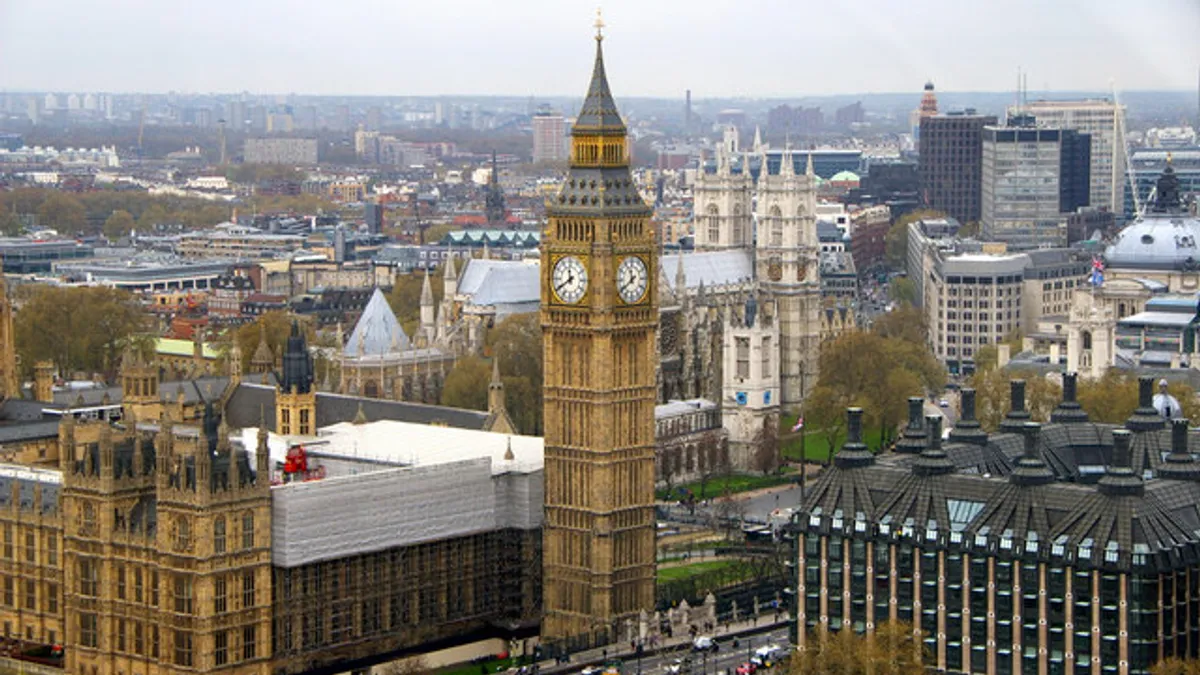Dive Brief:
- London Mayor Sadiq Khan has released a new draft "environment strategy" that includes a "zero waste" goal of sending no biodegradable or recyclable waste to landfills by 2026. The plan also calls for increasing the city's overall diversion rate of 52% — including residential and commercial material — to 65% by 2030, as reported by BusinessGreen.
- The plan pledges to make "the disposable economy a thing of the past," and outlines multiple circular economy ideas to begin heading in this direction. In the near-term, the plan also calls for the city's 33 local authorities to begin offering collection services for organic waste and at least six types of recyclable materials (glass, cans, paper, cardboard, plastic bottles and mixed plastics).
- On the commercial side, the plan calls for a potential zone collection system that would be divided up among London's business improvement districts. The plan also calls for better data collection about commercial waste activities in partnership with the U.K.'s Department for Environment, Food & Rural Affairs.
Dive Insight:
Khan, newly elected in 2016, has aspired to make London one of the "world's greenest cities" and this draft plan was highly anticipated. Leading up to its release, Khan's administration has also put forth plans for reducing transportation emissions and expanding "smart city" technologies. In addition to waste strategies, the new plan includes a long list of other priorities related to climate change adaptation, emissions reduction and improved quality of life. Because London is projected to run out of local landfill capacity by 2026 its current "linear economy" that creates about 7 million metric tons of waste per year is seen as unsustainable.
While London is continuing to expand its waste-to-energy capacity, due in part to strict European Union landfill directives, disposal of any kind of is still being discouraged. London's incineration rate is now the second-highest in the U.K. and that is seen as problematic. "Landfill and incineration are undesirable, costly and an inefficient use of resources," reads the plan. According to the Zero Waste International Alliance's definition, often held up as the top standard, the use of landfills or waste-to-energy facilities are equally discouraged. London, like many other cities, appears to be taking a more liberal approach to what achieving "zero waste" will look like.
Setting aside the unknown complications of post-Brexit environmental and economic regulations, London will also face its own unique challenges in reaching these targets. The city's dozens of local authorities provide varying degrees of collection service, with a high percentage of residents living in multi-unit buildings and a largely transient population. Businesses also aren't required to recycle and the city doesn't currently have authority to consolidate commercial collection without some form of new regulations. If Khan's administration chose to pursue changes to this system — following the example of New York cited in the plan — that process could take years.
Though as is the case in any city that has announced "zero waste" intentions, changing the existing system may be worthwhile even if it's bound to be difficult. Local media attention has already created a more active cultural conversation around marine litter, coffee cup recycling and food waste reduction than exists in many U.S. cities. The logistical challenges will be steep, but at least some London residents appear ready to do what it takes to help overcome them.













